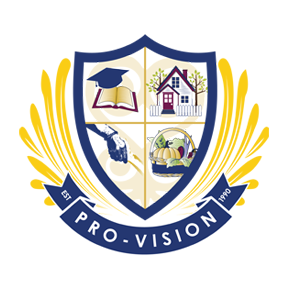Digging Up Life Lessons at the Pro-Vision Academy Urban Farm
“The soil is the great connector of lives, the source and destination of all. It is the healer and restorer and resurrector, by which disease passes into health, age into youth, death into life. Without proper care for it we can have no community, because without proper care for it we can have no life.” – Wendell Berry

To say Americans have a growing disconnect with farming is an understatement. In 1870 approximately 75% of people worked in agriculture in some form or fashion. According to the Bureau of Labor Statistics today that number has dropped to just 2%. Technology has had a huge impact on farming and allows fewer people to produce more food. However, there have been a number of drawbacks as well, and the demand for food is growing around the world.
One solution for food shortage problems and other concerns is urban gardens. These are small farms, some less than an acre in size, are created in urban areas, which haven’t traditionally been used for any kind of agriculture. Urban farms have become so popular in recent years that the USDA has dedicated an entire section of their website to informing people about the practice. Proponents cite a number of benefits for the community and gardeners:
- Less pollution because less produce is being shipped
- Recipients get the freshest food possible
- Encourages people to eat in season
- Encourages people to eat healthier
- Better control over pollutants like pesticides
- Urban gardens create beautiful green spaces
- Reduces runoff and land erosion
Most of all urban gardens help people gain a better appreciation for the earth and the wonder of the planet we all call home. Urban gardens can now be found in unexpected urban spaces like rooftops, schools and even the National Mall in Washington, DC.

The Educational Opportunities of an Urban Farm
There is so much that students can learn from a farm. It’s the ultimate classroom with the surrounding environment acting as the chalkboard with the day’s lesson and the soil serving at the desk at which the students work. Even in the middle of a metropolitan area like Houston an urban farm can provide kids with a whole new perspective on where their food comes from, the work and care that goes into growing food and the teamwork that’s involved to make it a successful community space.
Forward-thinking programs like those at Pro-Vision understand that an urban garden is an opportunity to help students grow personally and academically. Pro-Vision has set aside several acres of its campus and transformed it into an urban garden that is overseen by a certified horticulturist. Pro-Vision also works with local growers and the entire Sunnyside community to ensure the success of the Urban Farm.
Participants in the Manhood Development Program work in the farm, which also has an orchard and beehives. They help with the planting, growing and harvesting that happens three times a year. What students learn isn’t restricted to what’s needed to grow food. The produce from the urban farm is sold at farmer’s markets to cover costs of operating the farm, and proceeds are also donated to the community. Throughout the process students gain experience in marketing, sustainable land use, design and accounting in addition to farming.
There are plans to add an outdoor kitchen that will be used by local chefs to teach food preparation and lessons on nutrition. It will be part of the Community Garden Science and Outreach Program, which is geared towards helping parents and participants learn more about the importance of healthy eating.
If you’d like to get involved with the Pro-Vision’s Urban Farm there are volunteer opportunities all year long.Watch Ungodly Acts (2015) Full Movie Online Streaming Online and Download
Original Source: https://www.provision-inc.org/farm-work/digging-life-lessons-pro-vision-academy-urban-farm/
